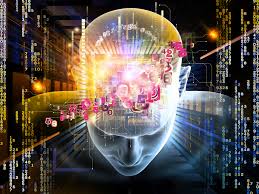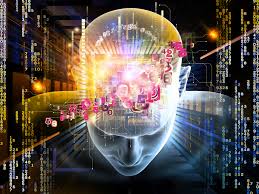
Humans will need to implant "neural laces" in their brains to keep up with computers that would be driven by artificial intelligence and machine learning which will create sophisticated computers.
These were the views of Tesla Motors and SpaceX CEO Elon Musk expressed while addressing a crowd of tech leaders this week.
During discussion at a conference by online publication Recode this week, top tech executives repeatedly said that artificial intelligence (AI) was on the verge of changing everyday life even while Musk's description of an injectable human-computer link may sound like science fiction.
According to a Bank of America report citing IDC research, the AI analytics research industry is set to grow to $70 billion by 2020 from just $8.2 billion in 2013 and tech companies are diving into this industry and it is no secret.
Already used in web search systems, marketing recommendation functions and security and financial trading programs, AI combs through large troves of raw data to predict outcomes and recognize patterns. The Bank of America report said that in the future, the technology will spread to driverless cars and service robots.
He sees a "huge opportunity" in AI, says Sundar Pichai, chief executive of Alphabet Inc's Google. Google is ahead of rivals such as Amazon.com Inc, Apple Inc and Microsoft Corp in machine learning as the company had first started applying the technology through "deep neural networks" to voice recognition software about three to four years ago, Pichai said.
However the work of building machines that teach themselves is still in its infancy, acknowledged Pichai and others. For example, after an AI chatbot talking on Twitter "learned" to make racist comments, Microsoft apologized and went back to the lab.
A profound impact on society by AI over the next 20 years was predicted by Amazon CEO Jeff Bezos.
"It's really early but I think we're on the edge of a golden era. It's going to be so exciting to see what happens," he said.
Amazon now has 1,000 employees working on Alexa, the company's voice-based smart assistant software system as the company has been working on artificial intelligence for at least four years, he said.
He said that hundreds of AI startups will hatch in the next few years even though big tech companies including Amazon have an edge at present because they have access to large amounts of data.
Since 2005 when IBM started developing its Watson supercomputer, the company has been working on artificial technology, which was named as a cognitive system by IBM CEO Ginni Rometty.
"I would say in five years, there's no doubt in my mind that cognitive AI will impact every decision made" from healthcare to education to financial services, Rometty said.
However, according to Adam Burrows, senior vice president of emerging businesses at HomeAdvisor, a unit of IAC/Interactive Corp, what captured the imagination of attendees was the comments by Tesla's Musk, on how he would potentially develop the technology to implant humans with technology to augment brains.
"It got people thinking on a philosophical level and away from what Google or Tesla will come out with next year. It brings up the question, are we human anymore if we are part computer?" he said.
(Source:www.reuters.com)
These were the views of Tesla Motors and SpaceX CEO Elon Musk expressed while addressing a crowd of tech leaders this week.
During discussion at a conference by online publication Recode this week, top tech executives repeatedly said that artificial intelligence (AI) was on the verge of changing everyday life even while Musk's description of an injectable human-computer link may sound like science fiction.
According to a Bank of America report citing IDC research, the AI analytics research industry is set to grow to $70 billion by 2020 from just $8.2 billion in 2013 and tech companies are diving into this industry and it is no secret.
Already used in web search systems, marketing recommendation functions and security and financial trading programs, AI combs through large troves of raw data to predict outcomes and recognize patterns. The Bank of America report said that in the future, the technology will spread to driverless cars and service robots.
He sees a "huge opportunity" in AI, says Sundar Pichai, chief executive of Alphabet Inc's Google. Google is ahead of rivals such as Amazon.com Inc, Apple Inc and Microsoft Corp in machine learning as the company had first started applying the technology through "deep neural networks" to voice recognition software about three to four years ago, Pichai said.
However the work of building machines that teach themselves is still in its infancy, acknowledged Pichai and others. For example, after an AI chatbot talking on Twitter "learned" to make racist comments, Microsoft apologized and went back to the lab.
A profound impact on society by AI over the next 20 years was predicted by Amazon CEO Jeff Bezos.
"It's really early but I think we're on the edge of a golden era. It's going to be so exciting to see what happens," he said.
Amazon now has 1,000 employees working on Alexa, the company's voice-based smart assistant software system as the company has been working on artificial intelligence for at least four years, he said.
He said that hundreds of AI startups will hatch in the next few years even though big tech companies including Amazon have an edge at present because they have access to large amounts of data.
Since 2005 when IBM started developing its Watson supercomputer, the company has been working on artificial technology, which was named as a cognitive system by IBM CEO Ginni Rometty.
"I would say in five years, there's no doubt in my mind that cognitive AI will impact every decision made" from healthcare to education to financial services, Rometty said.
However, according to Adam Burrows, senior vice president of emerging businesses at HomeAdvisor, a unit of IAC/Interactive Corp, what captured the imagination of attendees was the comments by Tesla's Musk, on how he would potentially develop the technology to implant humans with technology to augment brains.
"It got people thinking on a philosophical level and away from what Google or Tesla will come out with next year. It brings up the question, are we human anymore if we are part computer?" he said.
(Source:www.reuters.com)














